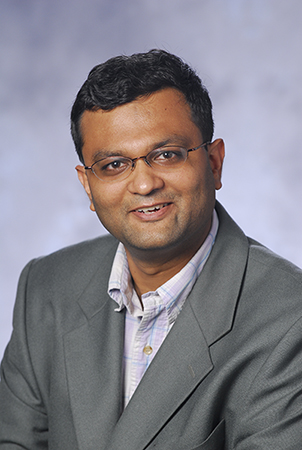May 20, 2024
By Ashley Ritchie
Chaitanya Deo, professor in the George W. Woodruff School of Mechanical Engineering, has been awarded the Southern Nuclear Termed Professorship in Nuclear and Radiological Engineering and Medical Physics (NREMP). Deo’s outstanding research accomplishments, leadership in his field, and the contributions he has made to Georgia Tech and the Woodruff School have led to this selection.
“I am thankful to Woodruff School leadership, Southern Nuclear, and the selection committee for this selection. I look forward to contributing to the NREMP program and the Woodruff School through this new professorship,” said Deo.
Deo will hold the position for a five-year term and receive discretionary funding to support his educational and research activities.
“I am grateful to Southern Nuclear for their generous support which will allow Chaitanya to achieve his vision of positioning the NREMP program to grow in areas related to advanced materials for nuclear reactors,” said Devesh Ranjan, Eugene C. Gwaltney, Jr. School Chair.
Since joining Georgia Tech in 2007, Deo has made a profound impact on the NREMP program. He has developed new interatomic potentials for uranium and created a new reduced order displacement cascade model for radiation damage in alloys and studied fretting wear in nuclear cladding. He has also developed nuclear materials courses at the undergraduate and graduate levels. In addition, he has led the NREMP program through two ABET reviews in 2014 and 2020, and through a major curriculum change in 2017-18. He currently serves as a member of the ABET Engineering Accreditation Commission and volunteers as an ABET engineering program evaluator.
Deo’s research lies at the intersection of engineering and science and is based on developing a fundamental understanding of underlying mechanisms of material behavior in extreme environments. His work has been funded by agencies of the U.S. Nuclear Regulatory Commission, Department of Energy, Department of Defense, and Department of Homeland Security. He has also collaborated with researchers at Los Alamos National Laboratory, Idaho National Laboratory, and Sandia National Laboratory. His research has been supported by more than 20 grants and contracts totaling more than $5 million and he has presented his work at multiple national and international conferences.
Deo has co-authored more than 50 journal publications, and edited a book, two book chapters, six conference proceedings, and five transactions. He has advised 10 Ph.D. students, most of whom are now working in research or academic positions. He has also mentored more than 20 undergraduate students as they explored research opportunities, including six undergraduates who participated in the Summer Undergraduate Research in Engineering program designed to attract qualified under-represented minority and women students into graduate school in the fields of engineering and science.
Deo received his B.E. from the University of Pune, India, in 1997. He received his M.S. and Ph.D. from the University of Michigan in 2000 and 2003, respectively and held a postdoctoral appointment at Los Alamos National Laboratory prior to starting his position at Georgia Tech.

